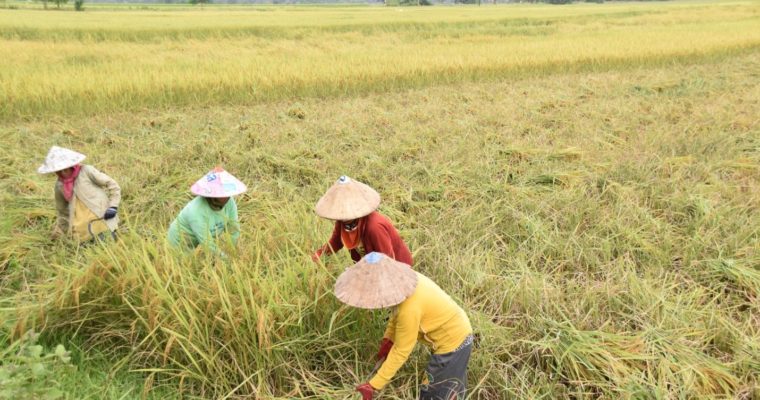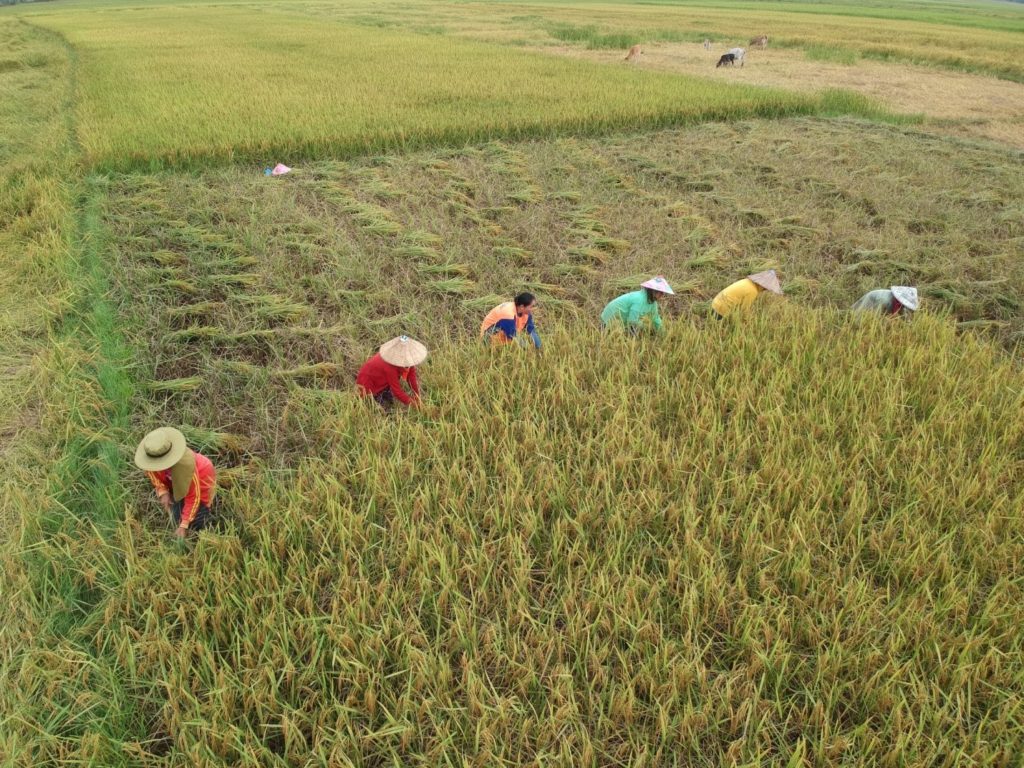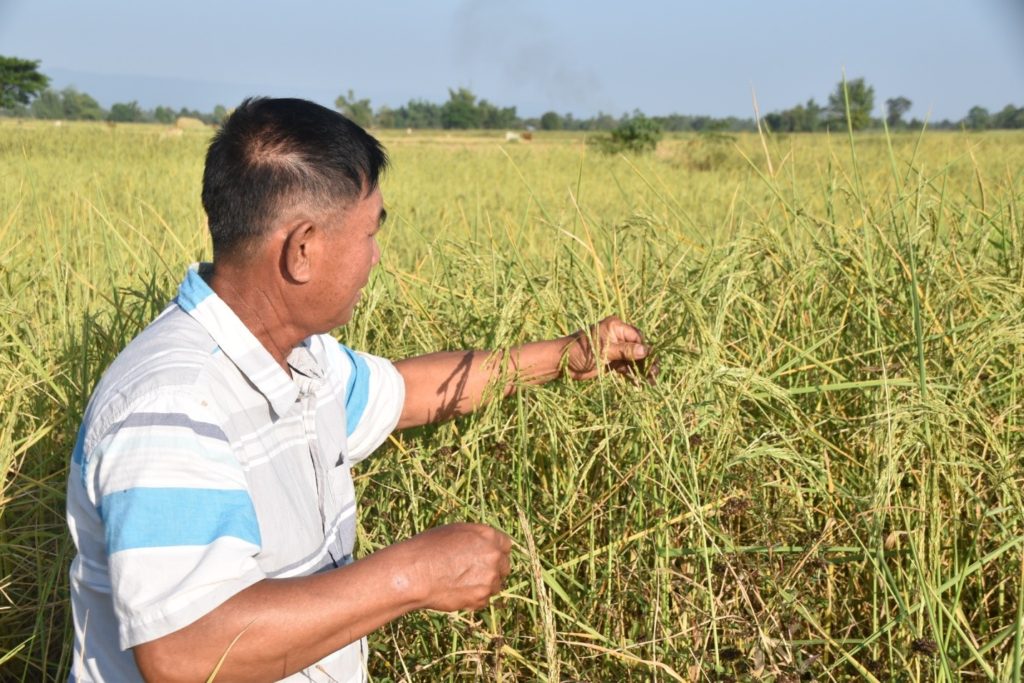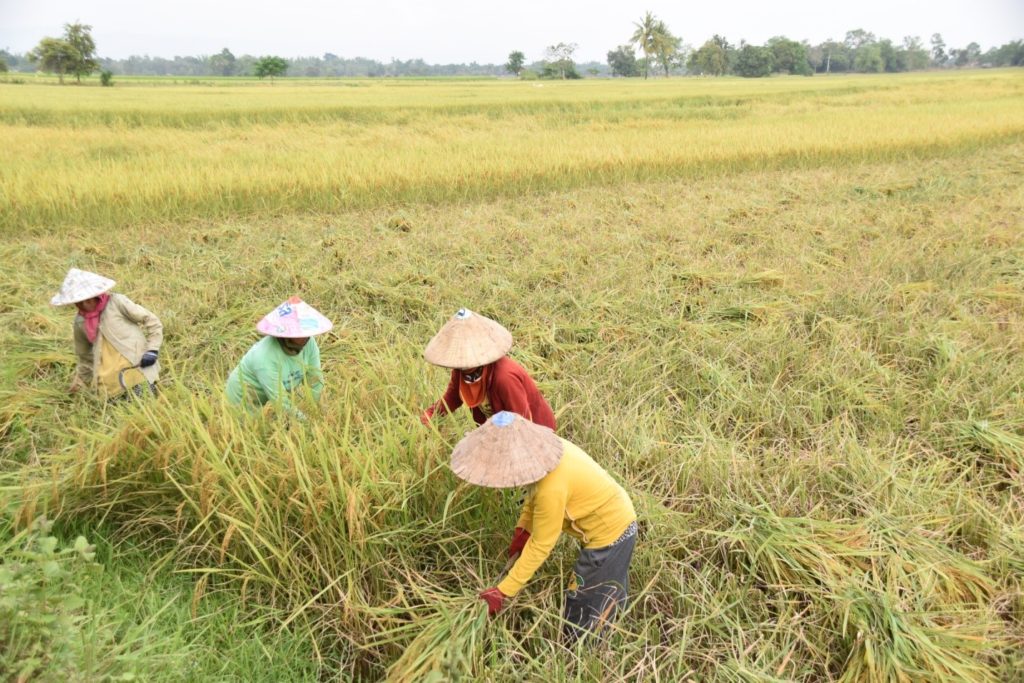Overview
Farmers in Tholakhom district, Vientiane province, have had rich experience on lowland rice farming practices for ages. Smallholder farmer worked individually and then farmers were formed as Jaeng Agriculture Cooperative. The farmers produced lots of tons of rice on a year basis, however, they face permanent market issue to sell their produce and farmers felt reluctant to grow rice due to low price. With support of Lao Farmer Network (LFN) to the farmers, direct contract with Phoon Nguen Rice Company was made, together with timely information support, better understanding and trusted communication between the local rice farmers and Rice Company. This provided win-win benefits for both local farmers and the Rice Company.
Background
Price of rice in 2018 is lower than 2,000 LAK (USD 0.23) per kilogram which discouraged farmers to produce rice for commercial purposes. The Lao Farmer Network contacted Phoon Nguen Rice Company who wanted organic jasmine rice to partner with Jaeng Agriculture Cooperative in Tholakhom district, Vientiane province.
The company guaranteed the rice price of 3,000 LAK (USD 0.34) per kilogram with a provision of seed and organic fertilizer in advance to the cooperative. In 2018, the cooperative mobilized seven farmers to produce the jasmine rice in an area of 10 hectares with a yield expectation of around 30 tons. Unfortunately, the cooperative faced natural disaster (flooding), thus, only 10 tons of rice was produced at the end of the season.
LFN conducted a field visit to collect data, and made a report on the effect of the natural disaster to the rice company. After that, the company understood that it was not the farmers’ fault, thus they agreed to free up the inputs (seed and fertilizers) to those who were affected by the flooding. In addition, due to the rise of rice price because of the flood, the company increased the purchasing price from 3,000 to 3,500 LAK (USD 0.34 – 0.40) to respond to the higher price of rice in other markets.
Because of a good experience of this partnership, in May 2019, the company resumes the partnership with the cooperative, this time with a higher demand. The company proposed to buy 100 tons of jasmine rice for 2019 with the same price of 3,500 LAK. Additionally, the company will reduce the price of organic fertilizer by half—from 70,000 to 35,000 LAK (USD 8.13 – 4) per sack.
With this partnership arrangement, the cooperative mobilized 25 members with a total area of 24 hectares to produce 72 tons of jasmine rice.
Innovations / Good Practices
The Jaeng Agriculture Cooperative is a rice seed producer group supported by an ADB-funded project in 2012. The group was established with the objective to supply third generation (R3) improved rice seeds to local markets. With the support from the past project, the group has trained farmers to be experts in rice production and in operating rice harvesting machine, drying machine, and rice storage. These farmer experts were equipped with knowledge and skills to be able to run a commercial rice and rice seed production.
However, due to lack of market demand on rice seeds, in 2015, the group stopped commercial rice seed production. In 2017, the group transformed from rice seed producer to agriculture cooperative in order to supply ordinary rice to the local market. However, the transition is not easy because the rice price is not stable. The cooperative bought rice from members right after the harvest season at USD 0.23 per kilogram, but the market price fell down to USD 0.20 causing a deficit for the cooperative.
To respond to the needs of the cooperative for market development, LFN introduced the cooperative to Phoon Ngeun Rice Company, a local company supplying well-packed milled rice in the markets in Vientiane capital. The company was introduced by the government rice seed center to the Lao Farmer Network.
Prior to the meeting between the cooperative and the company, LFN prepared information on both parties. LFN ensured that the cooperative knows their production cost, production capacity, and gate price of rice while ensuring that the company is clear with the volume of produce, standard of produce, price at the farm gate, and their extension services to the cooperative. A series of meetings between members of the cooperative was arranged for their own decision making while LFN met with the company to gather information to support the farmers in decision making.
Once both sides were ready, LFN organized a visit to the company head office where the negotiation between the company and the cooperative took place. Based on the result of the discussion, LFN drafted a contract and arranged the signing of the contract. The signed contract indicates that the company will provide 600 kilograms of rice seeds, 200 sacks of organic fertilizer (6 tons), price assurance at LAK 3,500 (USD 0.4) per kilogram at the farm gate, and that the company will be responsible for delivering the seeds and fertilizers and picking up the product after harvesting. Payment will be made in cash at the farm gate when the product is set for pick up. For the cooperative’s side, the farmers are responsible to supply at least 30 tons of organic rice to the company at the agreed price.
To further establish trust between the two parties, LFN invited the head of the rice company to visit the cooperative while delivering the production input.
Outcomes / Impact
The small holder farmers and the rice company made a win-win deal. The farmers were able to get rice seeds in the regular market at LAK 7,543 (0.87 USD) per kilogram while the organic fertilizer at half the price LAK 34,680 (USD 4) per 30 kilograms. The seeds and fertilizer were delivered by the company to the farm gate while the price of rice is guaranteed at LAK 3,500 (USD 0.4), a higher price compared to that in the regular market.
Before the contract:
LAK 2,000 LAK (USD 0.23) rice price / kg x 3,000 kg / hectare = LAK 6,000,000 (USD 690)
After the contract arrangement:
LAK 3,500 (USD 0.4) rice price/kg x 3,000 kg / hectare = LAK 10,500,000 LAK 9USD 1,200)
The latter shows 82% increase in the income of the farmer.
Facilitating Factors / Challenges
- Farmers are often afraid that the company will not buy their produce as promised in the contract like what happened in some instances in the past. On the other hand, the company is also afraid that the farmers will break their promise by selling their rice produce to other buyers that might offer a higher price to them. Furthermore, the company is afraid that the farmers will not use the organic fertilizers to maintain the organic standards. To respond to this challenge, LFN provided support to the cooperative to enhance their internal inspection and traceability to ensure that the rice produce will be in good standards. LFN also communicated with the company regularly for updates in the production.
- Transportation is very important because most of the small holder farmer organizations do not have vehicles.
- Small holder farmers need cash right away after the harvest. It is good if the company pays in cash right when they pick up the produce at the farm gate.
Lessons Learned
- Agriculture companies are enemies of small holder farmers. The companies can be allies of the farmers as shown in this case where a private company helped to fulfill the limitations of small holder farmers by engaging them in commercial agriculture.
- Farmer organizations can be successful in commercial production if the market is ensured.
- Establishing trust between the farmers’ organizations and the private company is important for a successful partnership.
Recommendations
- Knowing how important the private sector is, LFN studies the market and looks for potential private sectors that can match with members of the network.
- Helping farmers to be ready to partner with the private sector is essential. The farmers need to know their produce, production cost, and capacity to supply the amount on a regular basis. LFN helps its members to fully understand this.
- It is important to establish trust between the farmers’ organizations and the private company
About AFOSP-MTCP2
LFN is the implementer of AFOSP-MTCP2 in Laos.
AFOSP-MTCP2 is a capacity building program funded by the European Union (EU) with co-financing from the International Fund for Agricultural Development (IFAD) and the Swiss Agency for Development and Cooperation (SDC). The program is being implemented in seven ASEAN countries through the consortium Asian Farmers’ Association for Sustainable Rural Development (AFA) and La Via Campesina (LVC). AFOSP-MTCP2 supports the strengthening of national farmers’ organizations (FOs) and their national platform towards improving their institutional capacity to deliver economic services to their members as well as to effectively engage them in policy processes. At the ASEAN level, the consortium AFA – LVC works in partnership with the ASEAN Foundation in expanding the spaces for the engagement of FOs in ASEAN processes.







Comments are closed